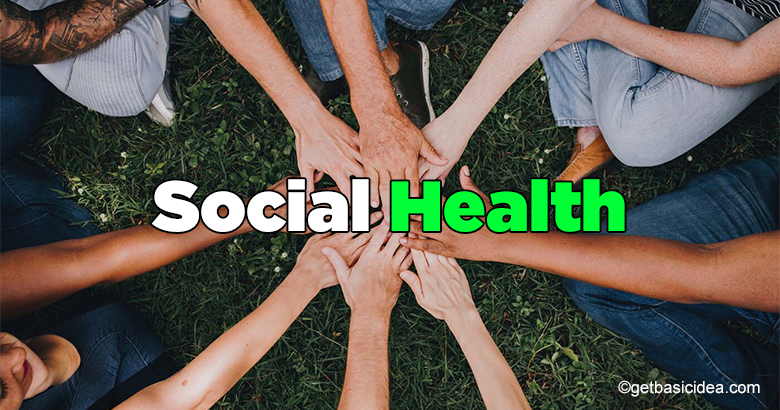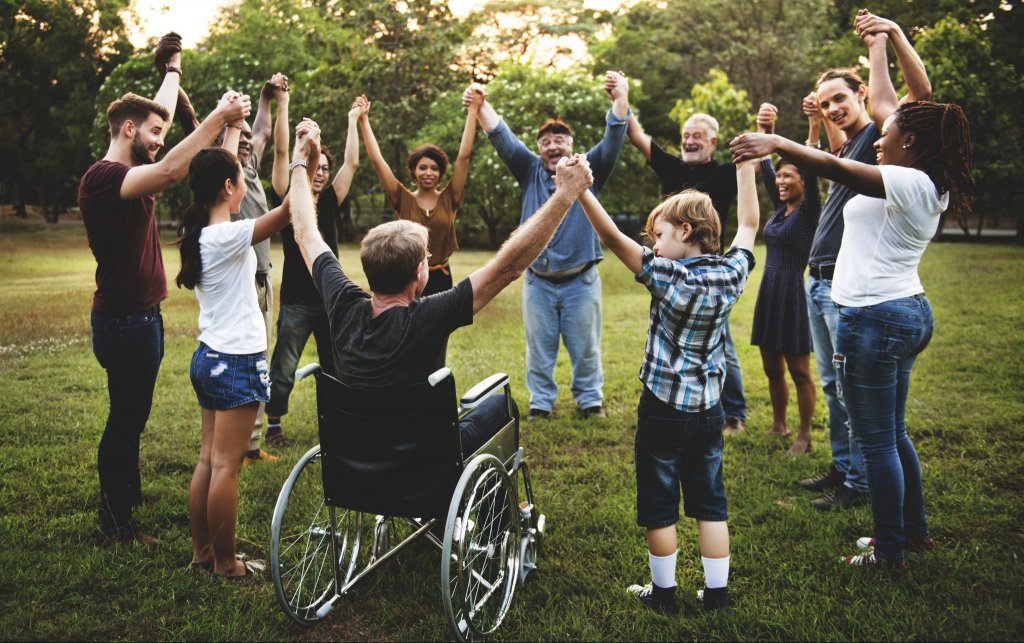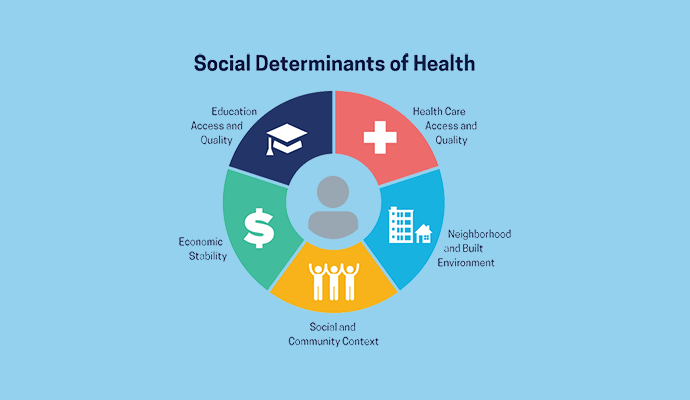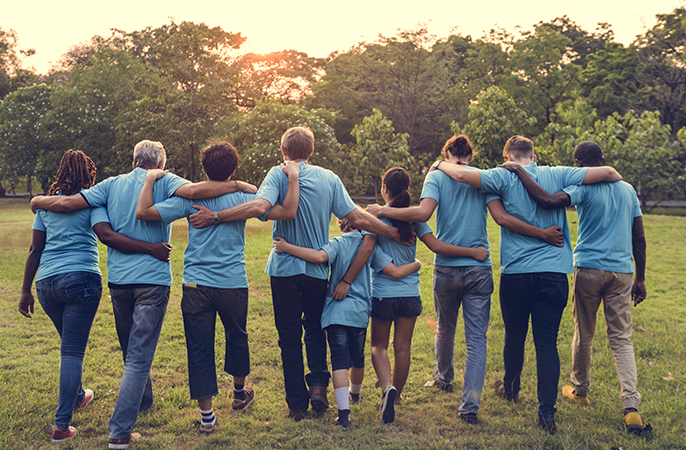In an age where people's social relations are constantly evolving, it's more important than ever for individuals to preserve their social well-being. Socially well-adjusted people live longer and have improved health. The more the researchers look into this particular subject, the stronger the connection between good social health and overall happiness becomes. Furthermore, it implies that workers are usually happier, which is always a good thing!

What is Social Health?
You can look after your physical health by following an exercise routine, and you can look after your mental health by using stress-reduction strategies or seeking the assistance of a behavioral therapist. So how's your social well-being? Relationships and well-being are inextricably linked and spending quality time with friends and family affects your physical and mental well-being. Social health refers to an individual's ability to develop secure and fulfilling interpersonal relationships with others around them.
Good social health shows in individuals like this:
[g_article_ads]
- Adapting to social circumstances
- Being true to yourself in all situations
- Managing your social and personal time in a balanced method
- Becoming involved in your group
- The opportunity to form and sustain friendships
- Setting and maintaining limits in friendships and relationships
Having a supportive network of family and friends

Social wellbeing is regarded as a cornerstone of wellness because it pertains to our ability to respond to social conditions and provides our support system for overcoming life's challenges. While loneliness and social isolation are not the same things, they are both important aspects of your social well-being.
Social isolation can be described simply as the degree to which a person or an individual is physically and/or emotionally isolated from others around him or her. Loneliness is the need for more social interaction than you are receiving. Even if you spend a lot of time with other people, it's possible to feel lonely. To put it another way, you don't have to be socially alone to be lonely; but, if you are, you are more likely to be lonely.
The Risks of Poor Social Health
One of the most apparent risks of social isolation is that if you have an accident or a medical emergency, you will have fewer and poorer interpersonal interactions, which means fewer people who will be able to assist you.
The threat, however, isn't just practical. Loneliness is a major risk factor for depression, and depressed people often have high systolic blood pressure. It can also cause inflammation and stress hormones to rise.
Although younger generations are more likely to experience isolation, older generations are at the highest risk of developing health problems as a result of it. According to some figures, up to 60% of Americans aged 50 and up are at risk of developing serious health problems as a result of chronic isolation. There are ways to bridge the gap between what you do and what you want to do when it comes to socializing. To maintain your social fitness, try these techniques with new and old mates.
Poor social health has a negative impact on physical health
[g_article_ads]
You may have noticed that when you're down and out, your physical and mental health suffers. Your overall well-being was likely to suffer if you stopped engaging with others during those periods.
Poor social health can lead to inflammation, heart disease, high blood pressure, a compromised immune system, chronic health problems, and mental health issues like anxiety.
The quantity and consistency of relationships, according to research, have an effect on mental and physical health. According to studies published in the Indian Journal of Psychiatry, loneliness is much more risky than smoking. It's much more concerning in senior citizens. And it isn't just when it comes to retirees. According to a study published by the National Academies of Sciences, Engineering, and Medicine (NASEM) in 2020, more than one-third of adults aged 45 and above are lonely. Nearly one-fourth of those aged 65 and up was classified as "socially isolated."
How to start being more Socially active?

- Begin small. If you're anxious about being more social, practice your social skills with people you already know to gain trust and build in your source of confidence.
- Be true to yourself. Attempting to alter your personality in order to make more friends would be exhausting and eventually futile. You already have a lot to say, so keep that in mind while you work to expand your social circle.
- Look for those who share your values. For example, if you enjoy reading, you might join a book club or take a local writing class. If you're a runner, find someone to run with. or If in case you're a musician, look for other artists to collaborate with. It would be easier to establish an initial bond because you will already have something in common.
- Concentrate on consistency rather than quantity. It's nice to have a lot of friends, but it's also important to note that the most beneficial relationships are those that are meaningful and optimistic.
- Choose friends who can motivate you to make good decisions. Surrounding yourself with people who want to see you excel would help you achieve your goals!
How to become much more socially active
Poor social health also leads to depression, and depression makes you feel as though you've lost the ability to make friends. Particularly outgoing people have trouble developing interpersonal relationships as they grow older, according to a 2012 meta-analysis, and a person's friend groups eventually decline over time. Fortunately, some easy, efficient strategies will help to reverse this pattern in both large and small ways.

Begin with the fundamentals.
Consider discussing your weekend plans or a favorite television program, and remember to listen and react to the other person. Sure, after five minutes of small talk, you won't instantly bond with anyone. But it's good practice for socializing in general, because you never know when you'll find something in common with others.
Make the time a Quality Time
[g_article_ads]
Even if you're lonely, there are probably some relationships in your life that could use your time and energy. Make a habit of reaching out to someone in your life at least once a week. Consider scheduling some in-person quality time, such as a weekly lunch date or a game night. You may be shocked to learn that the people you care about miss you just as much as you miss them.

Enjoy yourself by going somewhere different.
Sharing a mutual interest in a public or semi-public place is a perfect way to make an immediate bond. Do you like cooking? Register for a lesson. Do you like being outside? Meet up will help you find a hiking group (or start one). Some people have similar interests to you, and being in a public place will help to alleviate some of your fears.
Take care of yourself.
How do you make friends and improve your physical health at the same time? Join a gym with a friend or enroll in a community fitness class. You could join a running club or begin marathon training as the weather improves.
Locate Your Community

From churches and church groups to volunteer organizations that do good in the community, there are communities everywhere. You might also start attending town hall meetings and city council meetings to get interested in a political cause.
[g_article_ads]
There are a number of ways to keep old friendships intact while still creating new ones. However, there are moments when working on yourself with the aid of a therapist is the best way to improve your social well-being. Please contact your healthcare provider or make an appointment with an AMITA Health therapist if you need to speak to someone about feelings of isolation or depression.
Ways to encourage socially healthy individuals:

- Gather once a month to celebrate special occasions such as birthdays, work anniversaries, achievements, and team goals.
- Encourage non-work gatherings to get to know each other beyond happy hour. Coffee breaks and team-building activity days will help the team become more socially connected.
- Break bread together – It may still be done through Zoom, but sharing meals is a great way for people to get to know one another. Try organizing a lunch and learn event with a social hour before or after if you can do it in person.
- Create workplace fitness events – Socialize the squad for physical health benefits as well. Create health and well-being challenges as a team to support workers in a number of ways.
- Keep in mind to create opportunities for cross-team/department collaboration – Don't make teams feel isolated. Though people from various departments do not have much opportunity to communicate, assist them in getting to know one another. Board games in the lunchroom, meditation Monday meetings, and other low-pressure activities are excellent ways to get the teams together.
So, what exactly is social well-being? Holding yourself socially linked and in good relationships with others, in a nutshell. The above are only a few strategies for regaining mental health after pandemic lockdowns. As you might have observed during the pandemic, the need for social interaction with others is real. Take advantage of the opportunity to refresh and refocus on strengthening social health resources in the workplace when the team reconnects — whether in person or virtually.
Take a look at this video to understand at what level of social health you stand
Author of Get Basic Idea – Knowledge Base.
